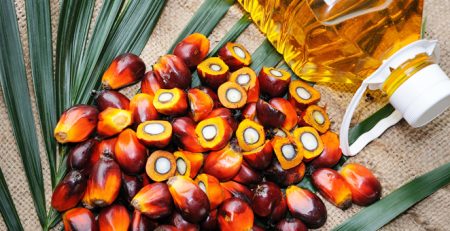What’s all this fuss about palm oil?

Is it good or bad for us and the environment?
Nutrition Myth Buster Jonny Bowden helps sort it all out
What’s all the fuss about palm oil? Google “palm oil” and you may be surprised by what you find. Not long ago, we were told it’s bad for us. Now we’re told it’s healthy. But what’s all this about deforestation? Do we need to worry about endangering baby orangutans? And are oil palm farmers really being kept in poverty? Nutrition Myth Buster Jonny Bowden, Ph.D., CNS, is anxious to help average consumers sort out the facts from fiction.
“Many people aren’t even aware of these controversies,” says Bowden. “But once they start digging around on the Internet, they find a lot being said on both sides.” He explains the facts behind five of the biggest concerns:
Issue #1: Tropical oils such as palm oil contain saturated fats, which are bad for you.
“This idea that saturated fat causes heart disease has finally been debunked. There was never any science behind it. Inflammation, not saturated fat, is what’s so dangerous. Palm oil contains less inflammatory omega 6s than most other oils, such as canola, soybean and corn. Palm oil is also the only oil that’s rich in Vitamin E tocotrienols, which help support heart and brain health.”
Issue #2: Rising demand for palm oil is bad for the planet.
“The truth is that oil palms only require about 1/10th the amount of agricultural land as other oil-producing crops, to produce the same amount of oil. The same trees will produce fruit every three months for 30 years. This is the world’s most efficient oil crop.”
Issue #3: Palm oil plantations are destroying the rainforests.
“Every country is different. Malaysia, for example, is one of the good guys. It produces sustainable palm oil. More than 50 percent of Malaysia’s forests are protected forever. Most of the oil palms are grown on old rubber plantations. It’s not newly cleared land. A lot of people get their geography mixed up. They think Indonesia and Malaysia are the same place. They are different countries. But Indonesia is finally trying to model its palm oil production after Malaysia’s, because Malaysia’s practices are more responsible and kinder to the planet.”
Issue #4: The palm oil industry is killing orangutans and elephants.
“I can’t speak to what’s happening everywhere, but I can confirm that Malaysia is the world’s leader on orangutan conservation. They take care of their wildlife. The Malaysian palm oil industry has established the Malaysian Palm Oil Wildlife Conservation Fund to support education and conservation programs, including the Borneo Elephant Sanctuary.”
Issue #5: Oil palm farmers are living in poverty.
“The Malaysian palm oil industry is being praised for lifting the family farmers – they call them smallholders – out of poverty, and for building new roads, schools and healthcare facilities.”
Bowden says educating ourselves is important, so that we can recognize truth versus exaggerated claims and make responsible decisions about the foods we consume.





Leave a Reply